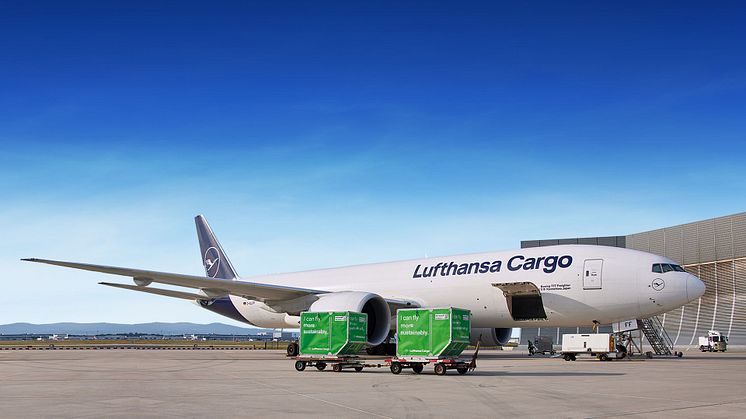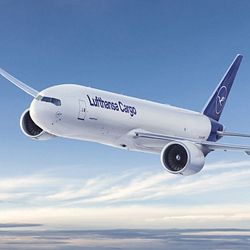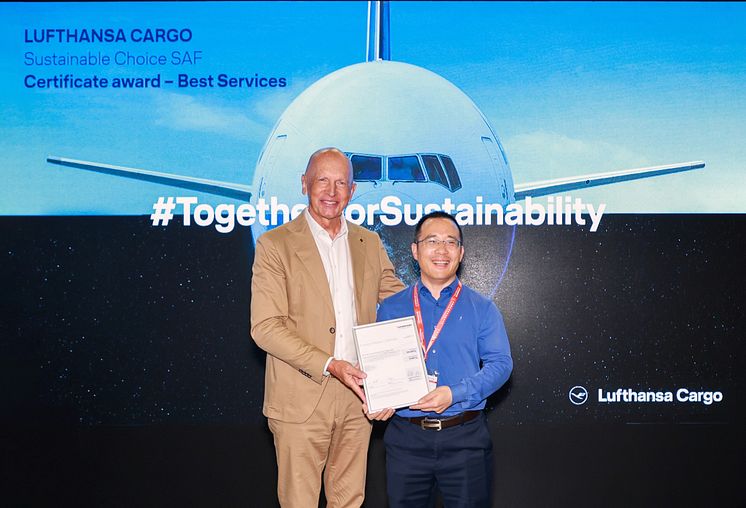
Press release -
Lufthansa Cargo and Best Services International Freight join forces to use sustainable aviation fuel
Both logistics companies commit to using sustainable aviation fuels to drive the decarbonization of the air cargo industry
Lufthansa Cargo and Best Services International Freight (BSI) have agreed to reduce the Chinese logistics company's CO2 emissions associated with airfreight. BSI will invest in a total of around 137,000 liters of Sustainable Aviation Fuel (SAF) at Lufthansa Cargo to offset the CO2emissions caused by its flights. The two companies reached the agreement on June 26 during this year's "transport logistic China" logistics trade fair in Shanghai.
"Best Services International Freight is our first customer in China to opt for the use of more than 100 tons of SAF," said J. Florian Pfaff, Head of Region Asia Pacific. "Examples like this help reduce our CO2 emissions and promote the use of SAF worldwide. Every customer who takes advantage of this opportunity is making a significant contribution to the decarbonization of logistics. The interest shows us that there is great potential for this, especially in Asia."
"The cooperation with Lufthansa Cargo strengthens our partnership. As China's leading air cargo logistics company and an industry leader in the digitalization process, we combine progress with responsibility," said Dr. Wilson Wong, Group CEO of BSI. "With limited SAF production globally, agreements like this are of paramount importance."
More climate-friendly flights with SAF
SAF is a critical technology key to more sustainable flying and essential to the energy transition in aviation. Over its entire lifecycle (production, delivery, combustion in the engine), biogenic SAF has a CO2 footprint that is approximately 80 percent lower than that of conventional kerosene. SAF can be used in regular flight operations without any infrastructure adjustments and is currently produced mainly from biogenic residues. The SAF used by Lufthansa Cargo is produced using the HEFA process (Hydroprocessed Esters & Fatty Acids), for example from used cooking oils. As only forestry, agricultural or catering waste is used, there is no conflict with food production. Lufthansa Cargo offers SAF via the Lufthansa Group from the world's leading manufacturers. Since September 2021, all Lufthansa Cargo customers have been able to have their freight transported more sustainably by opting for the "Sustainable Choice" add-on service.
The Lufthansa Group and its companies are actively involved in the research and development of the next generation of sustainable aviation fuels. In numerous projects worldwide, the Lufthansa Group is currently working with partners from science and industry on more SAF - from start-ups to established energy companies.
Lufthansa Cargo is pursuing a clear strategy for a more sustainable future and, together with the Lufthansa Group, has set itself ambitious climate protection targets: The Lufthansa Group aims to achieve a neutral CO2 balance by 2050 and to halve net CO2 emissions by 2030 compared to 2019 through reduction and compensation measures. In addition to SAF, more sustainable aviation also requires major efforts for a modern fleet and efficiency improvements in flight operations. Only in this combination can the change be successful in the long term.
Background on the use of SAF
As a drop-in fuel, SAF is compatible with fossil kerosene and can be easily blended with it. SAF can be used without modification of the aircraft and with the existing infrastructure. SAF is blended with fossil fuel prior to delivery to the airport. The maximum blending ratio of SAF with fossil aviation fuel currently allowed by the fuel specification is 50 percent.
Topics
Categories
Lufthansa Cargo AG
With revenue of 3.0 billion euros and a transport performance of 7.5 billion freight ton kilometers in 2023, Lufthansa Cargo is one of the world's leading companies in the transport of airfreight. The company currently employs around 4,150 people worldwide. Lufthansa Cargo's focus is on the airport-to-airport business. The route network covers around 300 destinations in more than 100 countries, using both freighter aircraft and cargo capacity from passenger aircraft operated by Lufthansa, Austrian Airlines, Brussels Airlines, Discover Airlines and SunExpress, as well as trucks. The majority of the cargo business is handled via Frankfurt Airport. Lufthansa Cargo is pursuing the goal of becoming the world's most environmentally friendly cargo airline. To achieve this, the company relies on state-of-the-art technologies and constant investments in the area of sustainability. In 2023, important milestones were reached, such as the investment in the continuous expansion of the B777F fleet, the expansion of short- and medium-haul networks with A321 freighters, and the continuation of the Sustainable Aviation Fuel program. In 2024, Lufthansa Cargo plans to successively equip its B777F fleet with Sharkskin technology, implement further digital services and contribute to reducing CO2 emissions through sustainable logistics solutions. Lufthansa Cargo is a wholly owned subsidiary of Deutsche Lufthansa AG and the specialist for the logistics business of the Lufthansa Group.





